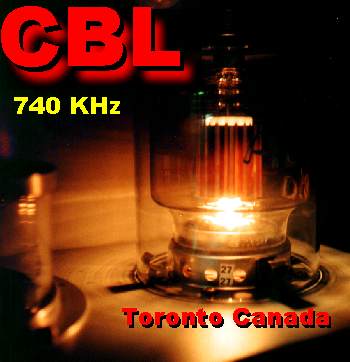CBC 740 AM, Adieu
Closing announcement of CBL-740 Toronto
0400 UTC June 20, 1999."This is CBC Radio One, broadcasting from the Hornby transmitter at 740 AM. In the Toronto area we will now move to 99.1 FM with additional frequencies throughout Southern Ontario. This transmitter has served the community well since 1937 and has been at 740 AM since 1941. This is the end of an era in Canadian broadcasting history. Now, signing off from CBL, adieu."
JANUARY 2001 UPDATE ON 740
The former CBC Radio 1 frequency, 740 AM, has been awarded to Oakville's CHWO (1250 AM), who are now operating "PrimeTime Radio" AM740, a station for people age 50 and over. The Ontario Dx Association is handling the QSL service for CHWO. The AM740 web site will be active after February 2000 at www.am740.ca
By the end of 1937, the new
CBC radio network had built a 50,000-watt transmitters near Toronto (CBL).
Interference from powerful US stations caused severe night time
interference so at an international conference in Havana, in 1937, an
agreement was reached for the redistribution of North American
frequencies. When it was ratified, it gave Canada eleven clear channels
ranging from high to medium power, and the shared use of forty-three
lower-power channels for regional and local service. One of these clear
channel frequencies was 740 kHz CBL.
network had built a 50,000-watt transmitters near Toronto (CBL).
Interference from powerful US stations caused severe night time
interference so at an international conference in Havana, in 1937, an
agreement was reached for the redistribution of North American
frequencies. When it was ratified, it gave Canada eleven clear channels
ranging from high to medium power, and the shared use of forty-three
lower-power channels for regional and local service. One of these clear
channel frequencies was 740 kHz CBL.
By now most CBL listeners will be aware that CBC has discontinuing many of its Radio One AM network stations moving to the FM band with the latest being CBL 740 at Hornby (near Toronto, Ontario, Canada).
 On
Wednesday September the 9th, 1998 (left to right)
webmasters Paul Cassel VE3SY for this site and Don Cassel VE3BUC for the
Ontario DX Association
along with Greg Hollinger VE3NXB and Gord Hayward VE3EOS of the K-W
Amateur Radio Club paid a last visit to this powerful station.
On
Wednesday September the 9th, 1998 (left to right)
webmasters Paul Cassel VE3SY for this site and Don Cassel VE3BUC for the
Ontario DX Association
along with Greg Hollinger VE3NXB and Gord Hayward VE3EOS of the K-W
Amateur Radio Club paid a last visit to this powerful station.
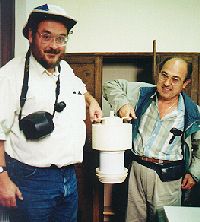 The
power for the station starts with 6146's driving a pair of 4-400's (see
above logo) which
drive a pair of huge EIMAC 3CX35000 finals. Gord and Roberto are
shown here holding one of the spare 4CX35000 rebuilt EIMAC tubes.
The
power for the station starts with 6146's driving a pair of 4-400's (see
above logo) which
drive a pair of huge EIMAC 3CX35000 finals. Gord and Roberto are
shown here holding one of the spare 4CX35000 rebuilt EIMAC tubes.
Modulation also starts with 6146's driving a pair of EIMAC 4CX2000 tubes which Screen modulate the pair of 3CX35000 finals.
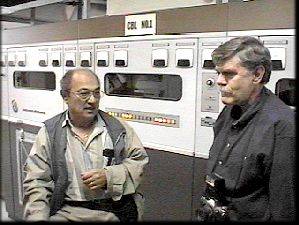 Our tour guide for the afternoon was Mr. Roberto Vissani C.E.T.
Roberto provided an excellent technical overview of the current facility
which hosts CBL 740kHz and CJBC on 860 kHz providing the CBC French
language service. Roberto is pictured here left speaking with Don
Cassel VE3BUC of the ODXA beside the large Continental CBL-2 50KW
transmitter.
Our tour guide for the afternoon was Mr. Roberto Vissani C.E.T.
Roberto provided an excellent technical overview of the current facility
which hosts CBL 740kHz and CJBC on 860 kHz providing the CBC French
language service. Roberto is pictured here left speaking with Don
Cassel VE3BUC of the ODXA beside the large Continental CBL-2 50KW
transmitter.
For those who may question the output of the station you can view the evidence on the meters below and calculate the DC Input power using the Ohms Law equation of . . . .
W = I x V (Wattage
= Current times Voltage)

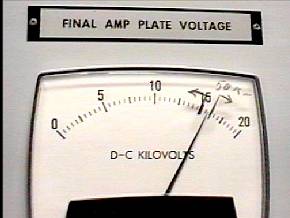
One of the mechanical wonders was the
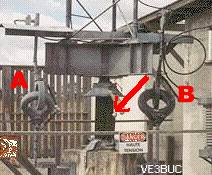 quite small ceramic insulator that supported the tower and guy wire
tension that places ten's of thousands of tons on the base. The red arrow
points to the single supporting insulator. Power to the tower lighting
system is isolated from the tower by feeding the power through two huge
toroid transformers marked A
and B.
100,000 watts of RF is present at the base of the tower. Add to that
the 3dB gain of the 5/8 wave vertical and we have a relative Effective
Radiated Power of 200,000 watts.
quite small ceramic insulator that supported the tower and guy wire
tension that places ten's of thousands of tons on the base. The red arrow
points to the single supporting insulator. Power to the tower lighting
system is isolated from the tower by feeding the power through two huge
toroid transformers marked A
and B.
100,000 watts of RF is present at the base of the tower. Add to that
the 3dB gain of the 5/8 wave vertical and we have a relative Effective
Radiated Power of 200,000 watts.
What is believed to be a world first was the combining of
two 50 KW stations into a single
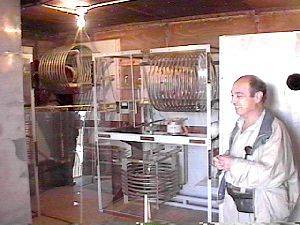 5/8 wave vertical tower (antenna). At first CBC engineers were planning on
maintaining two sites however the added cost of two towers, two sets of
engineers as well as site and maintenance costs made the challenge of
combing the two transmitters a worthwhile venture. Roberto is pictured
here during a brief stay in the combiner room.
5/8 wave vertical tower (antenna). At first CBC engineers were planning on
maintaining two sites however the added cost of two towers, two sets of
engineers as well as site and maintenance costs made the challenge of
combing the two transmitters a worthwhile venture. Roberto is pictured
here during a brief stay in the combiner room.
To maintain a safe level of exposure to this
 amount of RF energy, no one is allowed more than 15 minutes per day in
this building. To demonstrate the amount of RF, Roberto placed a small
screwdriver close to a metal object and produced this ARC. The audio of
the broadcast station/s could be clearly heard modulating the ARC.
Another hint that one was in an extreme filed of RF was my Video camera
which I used to capture these images became unusable if I was any closer
than 10 feet to the combiner and the camera would totally shut down when I
moved to within 4 feet of the combiner.
amount of RF energy, no one is allowed more than 15 minutes per day in
this building. To demonstrate the amount of RF, Roberto placed a small
screwdriver close to a metal object and produced this ARC. The audio of
the broadcast station/s could be clearly heard modulating the ARC.
Another hint that one was in an extreme filed of RF was my Video camera
which I used to capture these images became unusable if I was any closer
than 10 feet to the combiner and the camera would totally shut down when I
moved to within 4 feet of the combiner.
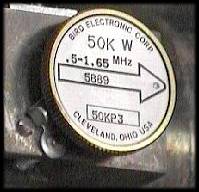 For those who love high power
For those who love high power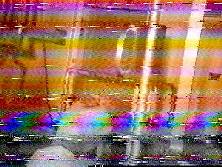 and have been unable to locate a "slug" for your BIRD
Watt Meter, try keeping an eye out for one like this at the Dayton
Fleamarket. I suspect however that one will have a long wait to spot one
of this power rating. The 3 Inch Heliax feed lines from the CBL and CJBC
transmitters both contained one of these elements.
and have been unable to locate a "slug" for your BIRD
Watt Meter, try keeping an eye out for one like this at the Dayton
Fleamarket. I suspect however that one will have a long wait to spot one
of this power rating. The 3 Inch Heliax feed lines from the CBL and CJBC
transmitters both contained one of these elements.
For a look at the ODXA images of the tour be sure to visit the Ontario DX Association web page . Be sure to check out the complete site as well.
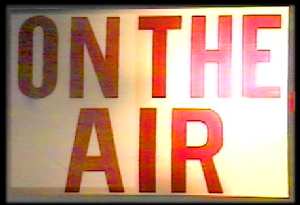
CBL
Nov
1937 - June 1999
she will be missed . . . .
| [ Top ] |
Last updated February 10, 2004 © 1998 - 2004 Hammond Museum of Radio |
